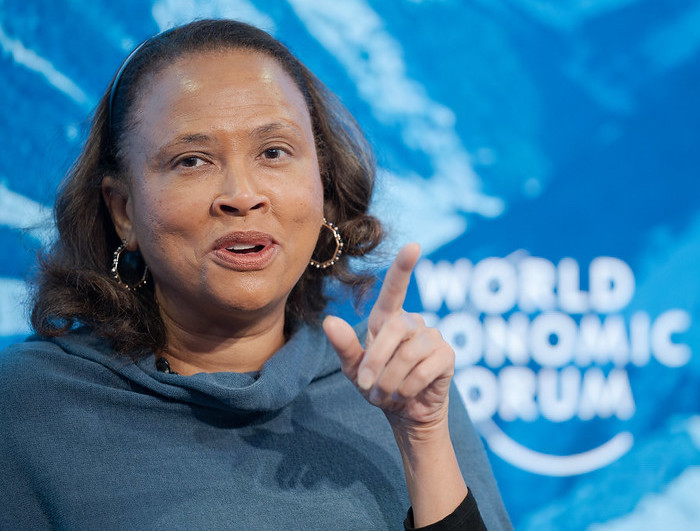‘Not just a moral imperative’: Schwab Foundation and Echoing Green call on businesses to team up with social innovators to drive equity
New research by the Global Alliance for Social Entrepreneurship shows three ways social innovators, corporations and governments can work together to better include marginalised racial and ethnic communities in business.
Companies and governments that work with social innovators to diversify their market, talent pools and supply chains are making a “smart business decision” while also addressing inequity, according to a new report.
The report, titled “Innovating for Equity: Unlocking Value for Communities and Businesses”, was published by the Schwab Foundation and World Economic Forum’s Global Alliance for Social Entrepreneurship on 21 March, in partnership with Echoing Green, as well as Equity Architecture, the GHR Foundation and Dalberg.
 François Bonnici, director of the Schwab Foundation and head of foundations at the World Economic Forum, said: “This report represents a call to action for leaders from across the public and private sectors to address racial and ethnic equity – not just as a moral imperative, but as a clear and compelling business case. By doing so, they can contribute to a more just and equitable society and unlock new avenues for sustainable economic growth and innovation.”
François Bonnici, director of the Schwab Foundation and head of foundations at the World Economic Forum, said: “This report represents a call to action for leaders from across the public and private sectors to address racial and ethnic equity – not just as a moral imperative, but as a clear and compelling business case. By doing so, they can contribute to a more just and equitable society and unlock new avenues for sustainable economic growth and innovation.”
Drawing on insights from six case studies, the report outlines how corporations and governments can partner with diverse social innovators to integrate racial and ethnic equity into global business practices.
For example, social enterprise RootsStudio, which works with artists from Indigenous and minority cultures to digitally licence their designs to global fashion brands, has increased the annual income of its most engaged artists by over 70%.
 Cheryl L Dorsey, president of Echoing Green, said: “Supporting these largely untapped areas of innovation and growth has the potential to include millions of customers, employees, entrepreneurs and investors in the global economy. Now is the time for corporations, policy-makers and innovators to come together and drive meaningful, system-wide transformation.”
Cheryl L Dorsey, president of Echoing Green, said: “Supporting these largely untapped areas of innovation and growth has the potential to include millions of customers, employees, entrepreneurs and investors in the global economy. Now is the time for corporations, policy-makers and innovators to come together and drive meaningful, system-wide transformation.”
In the US alone, the widening racial wealth gap is estimated to cost up to $1.5tn in economic growth by 2028, which translates to a cap on GDP growth of 6%.
The report presents three ways in which businesses and governments can collaborate with social innovators to support marginalised communities and achieve sustainable economic growth. They include the following:
- Expanding markets: Companies can serve a larger customer base by providing products and services that better meet the needs of different communities. For example, social enterprise Hello Tractor uses an innovative equipment-sharing app to connect tractor owners to smallholder farmers in Nigeria and Kenya. This enables rural communities to benefit from increased yields and incomes and gives agricultural equipment manufacturers access to new user markets.
- Unlocking talent: Implementing equitable hiring practices can widen access to untapped talent pools, reshape employment opportunities and remove barriers faced by individuals, businesses and communities. For example, R3 Score, a contextualised assessment tool created by criminal justice reform non-profit Mission Launch, accurately gauges risks presented by applicants with criminal records. This enables businesses in the US to make fairer assessments of candidates with criminal records, which are disproportionately overrepresented in Black and Latinx communities.
- Broadening networks: Social innovators can build more diverse and inclusive supplier ecosystems by connecting businesses with underrepresented vendors. For example, PretaHub, a network of Black entrepreneurs in Brazil, helps connect corporate partners to Afro-Brazilian vendors, enabling them to widen their customer base to include Afro-Brazilian consumers, over half of Brazil’s population.
You’re not doing charity by working with leaders who have experience of marginalisation. You’re also making a good business decision
 Chelsea A Jackson, political scientist, founder of research consultancy Equity Architecture and one of the contributors to the report, said: “This report is saying to businesses and governments: ‘You’re not doing charity by working with leaders who are coming from these communities who have experience of marginalisation… who have experience of being excluded from the economy, from opportunities, because of histories of colonialism and racism. You’re not simply doing the right thing. You’re also making a good business decision.’”
Chelsea A Jackson, political scientist, founder of research consultancy Equity Architecture and one of the contributors to the report, said: “This report is saying to businesses and governments: ‘You’re not doing charity by working with leaders who are coming from these communities who have experience of marginalisation… who have experience of being excluded from the economy, from opportunities, because of histories of colonialism and racism. You’re not simply doing the right thing. You’re also making a good business decision.’”
Top photo: African business owner in marketplace, courtesy of Freepik
Thanks for reading our stories. As an entrepreneur or investor yourself, you'll know that producing quality work doesn't come free. We rely on our subscribers to sustain our journalism – so if you think it's worth having an independent, specialist media platform that covers social enterprise stories, please consider subscribing. You'll also be buying social: Pioneers Post is a social enterprise itself, reinvesting all our profits into helping you do good business, better.



